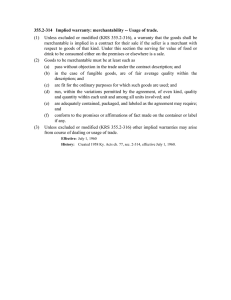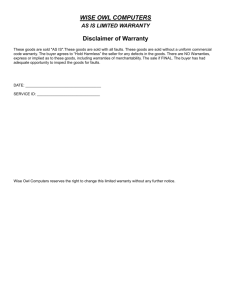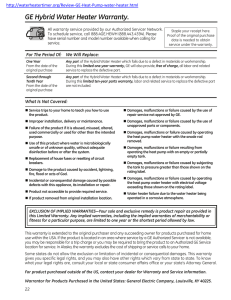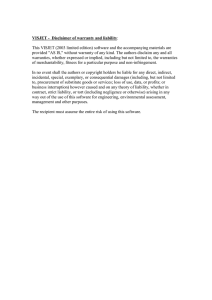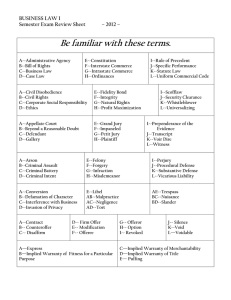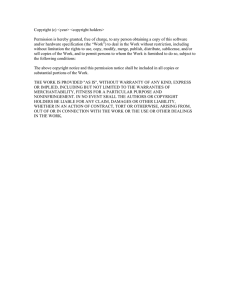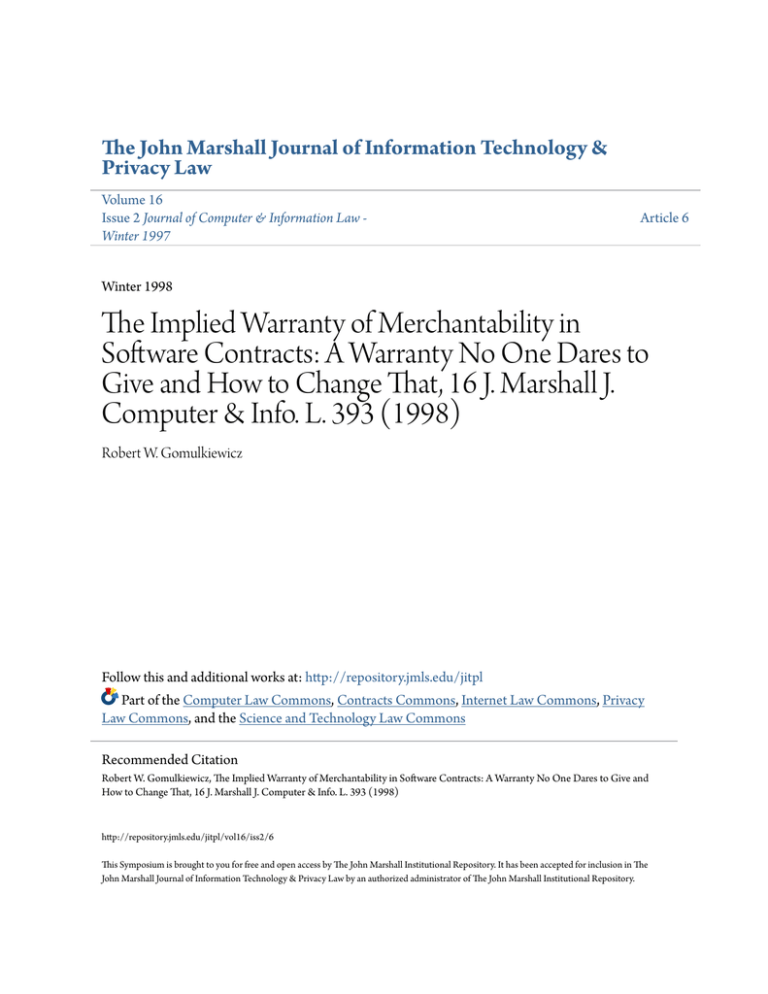
The John Marshall Journal of Information Technology &
Privacy Law
Volume 16
Issue 2 Journal of Computer & Information Law Winter 1997
Article 6
Winter 1998
The Implied Warranty of Merchantability in
Software Contracts: A Warranty No One Dares to
Give and How to Change That, 16 J. Marshall J.
Computer & Info. L. 393 (1998)
Robert W. Gomulkiewicz
Follow this and additional works at: http://repository.jmls.edu/jitpl
Part of the Computer Law Commons, Contracts Commons, Internet Law Commons, Privacy
Law Commons, and the Science and Technology Law Commons
Recommended Citation
Robert W. Gomulkiewicz, The Implied Warranty of Merchantability in Software Contracts: A Warranty No One Dares to Give and
How to Change That, 16 J. Marshall J. Computer & Info. L. 393 (1998)
http://repository.jmls.edu/jitpl/vol16/iss2/6
This Symposium is brought to you for free and open access by The John Marshall Institutional Repository. It has been accepted for inclusion in The
John Marshall Journal of Information Technology & Privacy Law by an authorized administrator of The John Marshall Institutional Repository.
THE IMPLIED WARRANTY OF
MERCHANTABILITY IN SOFTWARE
CONTRACTS: A WARRANTY NO
ONE DARES TO GIVE AND
HOW TO CHANGE THAT
by
ROBERT
W. GOMULKIEWICZt
"There is no more puzzling question than what this word [merchantable] means."
Karl Llewellyn
1
A disclaimer of ALL IMPLIED WARRANTIES, INCLUDING WITH-
OUT LIMITING THE IMPLIED WARRANTY OF MERCHANTABILITY, greets virtually everyone who prepares to use a computer software
product. 2 Software publishers disclaim the implied warranty of
merchantability because they do not know what they might be promising
if they give it. Though the disclaimer is routine, software publishers
have little interest in needlessly eroding confidence in the quality of their
products by conspicuously disclaiming a warranty with which their products may well comply. Disclaimers feed suspicion, voiced by industry
critics, that software publishers care little about software quality or
standing behind their products. 3 Nonetheless, most software publishers
t Copyright @ 1997 Robert W. Gomulkiewicz. All rights reserved. Mr.
Gomulkiewicz is a senior corporate attorney for Microsoft Corporation. The views expressed in this article are the personal views of the author, not those of Microsoft Corporation. The author would like to thank Maureen Cyr, Liam Lavery, Robert Mitchell, and
Holly Towle for their contributions to this article. The author would also like to express his
appreciation to Cem Kaner, with whom he collaborated in proposing a revised implied warranty of merchantability to the Article 2B Drafting Committee.
1. KARL N. LLEWELLYN, CASES AND MATERIALS ON THE LAw OF SALES 324 (1930).
2. Even consumer advocate Consumer's Union disclaims the warranty of
merchantability in its software contracts. See End User License Agreement accompanying
Consumer Reports Cars 1997 Edition CD ROM.
3. See Alex Fernandez, Software's 'as-is" Clause, PERSPECITWES (Aug. 20, 1997)
<http://www.news.com/Perspectives/GuestafS_20_97a.html> ("Most of the time it looks
like useless blah blah, until you find the computer crashes every time you run the program.
At that moment the as-is clause makes you feel like someone is laughing behind your
back"); Cem Kaner & David L. Pels, Artice 2B and Software Customer Dissatisfaction,
394
JOURNAL OF COMPUTER & INFORMATION LAW
[Vol. XV
believe it is unreasonable to shoulder the risk of agreeing to a contract
term that, in Llewellyn's words, is "puzzling" and could result in un4
known but large liability.
Underlying the implied warranty of merchantability is a salutary
purpose: the purchaser of a good should be assured that it will meet a
baseline standard of quality for goods of its kind. That the warranty is so
commonly disclaimed reflects that this purpose remains unfulfilled. Potentially ambiguous phrasing of the warranty may be unavoidable under
Article 2 of the U.C.C., given the broad scope of that article. Proposed
U.C.C. Article 2B, however, presents an opportunity to create a version
of the warranty of merchantability for computer software that addresses
the problems of uncertainty and ill fit. If the warranty sets a reasonable
and understandable measure of quality for software products, software
publishers will be less apt to disclaim it, and end users will be better
served by a warranty that exists in practice as well as in theory.
I.
ORIGINS OF THE IMPLIED WARRANTY OF
MERCHANTABILITY
Breach of warranty actions arose out of the English commodities
markets and protected buyers who bought goods that did not conform to
a seller's representations about them. Breach of warranty was originally
a tort; it was viewed as a form of misrepresentation. To make a successful case, a buyer had to show that the seller made a false statement of
fact about the quality of goods sold, on which the buyer relied. Although
breach of warranty was not clearly distinguished from deceit, courts
from as early as the 17th century held that sellers could breach the war5
ranty even when their misstatements were innocent and unknowing.
By the early 1800s warranties had entered the realm of contract.
The implied warranty action developed as a remedy for aggrieved buyers
who did not have the benefit of an express warranty to establish nonconSUPPORT STATISTICS, May 27, 1997 (distributed at the 1997 Annual Meeting of the National
Conference of Commissioners on Uniform State Laws). Other sources find high customer
satisfaction with software products. See John Morris, Readers Rate Software Support &
Satisfaction, PC MAG., July 1997, at 199 ("As in previous years, the results are generally
positive. Most respondents give the products they use ratings of 8 or higher on a scale of 1
to 10 for satisfaction, and-with a few exceptions-give vendors solid ratings for technical
support as well"); Peggy Watt, How Happy Are You... Really?, PC MAG., July 1993, at 31112 ("Are customers satisfied? You bet").
4. Their reluctance is hardly unique: vendors of all sorts of products routinely disclaim implied warranties. See Velez v. Craine & Clarke Lumber Corp., 341 N.Y.S.2d 248,
252 (N.Y. App. Div. 1973), rev'd, 305 N.E.2d 750 (N.Y. 1973) (lumber buyer's superintendent could not recall seeing an invoice in 20 years that lacked a disclaimer of implied
warranties).
5. William L. Prosser, The Implied Warranty of Merchantable Quality, 27 MINN. L.
REV. 117, 118-19 (1943).
1997]
IMPLIED WARRANTY OF MERCHANTABILITY
forruity of the goods they had purchased. 6 Courts began to find that
sales contracts lacking explicit warranties held implicit promises that
the goods met certain minimum quality standards. An early case in
which the court found an implied warranty was Gardiner v. Gray.7 In
that case, a buyer contracted for a quantity of "waste silk," delivered
from abroad. Neither the buyer nor the seller saw the silk before delivery. When it turned out to be of very poor quality, the court allowed the
buyer to rescind the contract. The court held that "the intention of both
parties must be taken to be, that [the goods] shall be saleable in the market under the denomination mentioned in the contract between them."8
The court inferred that a contract naming the good to be sold contained
an implicit promise by the seller to deliver something sufficiently genuine to be re-sold under that name.
Subsequent cases adopted the term "merchantable" to describe this
implied warranty: if a buyer could not inspect goods before delivery, and
if there were no express warranties, a sales contract contained an implicit promise not only that the goods would be of a quality that could be
sold on the market under the contract description, but also that they
were reasonably fit for the ordinary uses to which such goods were put. 9
These principles, first codified in this country in the Uniform Sales Act, 10
were carried
over into Article 2 of the Uniform Commercial Code
1 1
("U.C.C."I).
6. ORA FRED HARRIS, JR. & ALPHONSE M. SQUILLANTE, 1 WARRANTY LAW IN TORT AND
CONTRACT ACTIONS 179 (1989).
7. 171 Eng. Rep. 46 (K.B. 1815).
8. Id. at 47. The court observed pointedly that a "purchaser cannot be supposed to
buy goods to lay them on a dunghill." Id.
9. Prosser, supra note 5, at 121.
10. Section 15(2) of the Uniform Sales Act (1906) provides that "[wi]here the goods are
bought by description from a seller who deals in goods of that description (whether he be
the grower or manufacturer or not), there is an implied warranty that the goods shall be of
a merchantable quality."
11. U.C.C. § 2-314 (1995) contains a definition of"merchantable" that provides in relevant part:
(1) Unless excluded or modified... , a warranty that the goods shall be merchantable is implied in a contract for their sale if the seller is a merchant with respect to
goods of that kind ....
(2) Goods to be merchantable must be at least such as
(a) pass without objection in the trade under the contract description; and
(b) in the case of fungible goods, are of fair average quality within the description; and
(c) are fit for the ordinary purposes for which such goods are used; and
(d) run, within the variations permitted by the agreement, of even kind, quality and quantity within each unit and among all units involved; and
(e) are adequately contained, packaged, and labeled as the agreement may require; and
396
JOURNAL OF COMPUTER & INFORMATION LAW
[Vol. XV
Although the principle underlying the implied warranty of
merchantability is straightforward, its application is not. 12
"Merchantability" is generally determined by comparing a particular
good to others like it on the market. Courts may rely on what is custom14
ary in the trade, 13 or what is common among goods of the same price
15
and in the same general class.
Partly because the scope of the warranty turns on questions of fact, 16 juries may determine the outcome,
sometimes yielding surprising results. A jury in New York, for example,
found that Ford had breached the implied warranty of merchantability
when it sold a four-wheel-drive Bronco II to a suburban driver: the high
center of gravity, narrow track, short wheelbase, and stiff suspension (all
of which contributed to off-road performance) made such vehicles unusually susceptible to rollovers on paved roads. The New York Court of Appeals ruled that there was no inconsistency between this verdict and the
jury's finding that the vehicle was not defective under product liability
17
standards.
Courts often apply the enumerated definitions of merchantability in
U.C.C. Section 2-314 without distinguishing among them, but some differences have emerged from the case law and commentary. "[F]it[ness]
(f) conform to the promises or affirmations of fact made on the container or
label if any.
(3) Unless excluded or modified . . . other implied warranties may arise from
course of dealing or usage of trade.
Id
12. See LLEWELLYN, supra note 1, at 324-25.
13. For example, cattle feed containing a hormone that causes sterility is not merchantable when sold to feed breeding cattle; although the hormone is a common additive to
cattle feed, it is ordinarily excluded from the feed of breeding cattle. JAMEs J. WHITE &
ROBERT S. SUMMERS, HANDBOOK OF THE LAW UNDER THE UNIFORM COMMERCIAL CODE § 9-8,
at 356 (4th ed. 1995) [hereinafter WHITE & SUMMERS 4th ed.] (citing Kassab v. Central
Soya, 246 A.2d 848 (Pa. 1968)).
14. The warranty may be narrower in scope for goods sold at below-market prices.
Nonetheless, price is only one factor to consider and cannot be determinative. WHITE &
SUMMERs 4th ed., supra note 13, at 356. See Brochner v. Western Ins. Co., 724 P.2d 1293
(Colo. 1986); International Petroleum Servs, Inc. v. S & N Well Serv., Inc., 639 P.2d 29
(Kan. 1982).
15. For example, although some cigarettes may cause lung cancer in some users, a
court found the particular cigarettes at issue to be nonetheless merchantable because
"[t]hey are exactly like all others of the particular brand and virtually the same as all other
brands on the market." WHITE & SUMMERS 4th ed., supra note 13, at 353 & n.4 (citing
Green v. American Tobacco Co., 391 F.2d 97, 110 (5th Cir. 1968) (dissenting opinion of
Simpson, J., adopted as majority opinion in 409 F.2d 1166)).
16. See, e.g., Levy v. O'Neill, 27 U.C.C. 692 (Mass. App. Ct. 1979).
17. Denny v. Ford Motor Co., 662 N.E.2d 730, 739 (N.Y. 1995). See also Vlases v.
Montgomery Ward & Co., Inc., 377 F.2d 846, 850 (3rd Cir. 1967) (non-discoverability of
defect no bar to recovery); Charney v. Ocean Pontiac, Inc., 17 U.C.C. 982 (Mass. App. Ct.
1975); Smith v. Fiat-Roosevelt Motors, Inc., 556 F.2d 728, 732 (5th Cir. 1977) (car dealer
impliedly warrants crashworthiness).
1997]
IMPLIED WARRANTY OF MERCHANTABILITY
for the ordinary purposes for which such goods are used" is a carry-over
from the common law; it means that a good is genuine and reasonably
able to perform the ordinary purpose for which it was intended.' 8
"[Plass without objection in the trade under the contract description" is
similar to "fit for ordinary purposes," but with a greater focus on what is
customary in the trade. 19 In order to "pass without objection," goods
need not be perfect, but cannot be of a quality so low that they would not
ordinarily be sold by other merchants. 20 For consumer products, goods
should be of a quality that conforms to consumer expectations for goods
21
of that class.
The remaining four U.C.C. definitions have been less influential in
the case law. Fungible goods of "fair average quality within the description" should be in the "middle belt of quality;" although some may be of
below average quality, they cannot be all or predominantly so. 22 Generally, goods that are "adequately contained, packaged, and labeled" are
labeled well enough to warn unknowing buyers of possible dangers. No
notable case has applied the requirement that goods run "of even kind,
quality and quantity." The final provision, requiring goods to "conform
to the promises or affirmations of fact made on the container or label if
any," is not emphasized by courts because it overlaps with Section 2-313,
23
concerning express warranties.
There are relatively few cases in which the courts have construed an
implied warranty of merchantability in software transactions. 24 Such
18. For example, a haystacking machine that catches fire the first day it is used is not
fit for the ordinary purpose of stacking hay. JAMES J. WHITE & ROBERT S. SUMMERS, HANDBOOK OF THE LAw UNDER THE UNIFORM COMMERCIAL CODE § 9-8, at
476 (3rd ed. 1988)
[hereinafter WHITE & SumMERs 3d ed.] (citing Nerud v. Haybuster Mfg., Inc., 340 N.W.2d
369 (Neb. 1983)). The good's ordinary purpose is one that the merchant can reasonably
foresee. Debra L. Goetz et al., Article Two Warranties in Commercial Transactions: An
Update, 72 CORNELL L. REV. 1159, 1209 (1987).
19. WHITE & SUmMERs 3d ed., supra note 18, at 477.
20. For example, although wine with Fresno mold might be drinkable, it is not merchantable because other merchants would not have sold the wine in such a state. WHITE &
SUMMERS 3d ed., supra note 18, at 477 (citing Delano Growers' Coop. Winery v. Supreme
Wine Co., 473 N.E.2d 1066 (Mass. 1985)).
21. For example, selling a wrecked but subsequently repaired Corvette as a used car
does not conform to public expectations. Goetz et al., supra note 18, at 1207 (citing Thomas
v. Ruddell Lease-Sales, Inc., 716 P.2d 911 (Wash. Ct. App. 1986)).
22. U.C.C. § 2-314, Official Comment 7 (1995).
23. Goetz et al., supra note 18, at 1212-13.
24. The courts in the following cases either applied the implied warranty of
merchantability to software transactions or indicated a readiness to do so (but were prevented by effective disclaimers, for instance): L.S. Heath & Son, Inc. v. AT&T Info. Sys.,
Inc., 9 F.3d 561 (7th Cir. 1993); Mesa Bus. Equip., Inc. v. Ultimate Southern California,
Inc. 1991 (9th Cir. 1991); Step-Saver Data Sys., Inc. v. Wyse Tech., 939 F.2d 91 (3rd Cir.
1991); Sierra Diesel Injection Servs, Inc. v. Burroughs Corp., 874 F.2d 653 (9th Cir. 1989);
Neilson Bus. Equip. Ctr., Inc. v. Italo v. Monteleone, 524 A.2d 1172 (Del. 1987); McCrim-
398
JOURNAL OF COMPUTER & INFORMATION LAW
[Vol. XV
transactions sometimes resemble the provision of services more than the
sale of a product; moreover, software transactions commonly involve licensing. Hence, courts have been circumspect about applying Article 2
to these transactions. 25 In the software contract warranty cases that
have arisen, the courts have made no attempt to tailor their construction
of the warranty to the unique nature of software or software transactions. Consequently, a warranty that was a puzzle in the context of sales
of goods is being applied out of context to software licenses.
II.
WHY THE WARRANTY IS DISCLAIMED IN SOFTWARE
CONTRACTS
Vendors routinely disclaim the implied warranty of merchantability
in commercial and consumer contracts, both within the software indus26
try and outside of it. To be sure, disclaimers are not always effective.
U.C.C. Section 2-316 prescribes certain procedures that vendors must
follow to disclaim implied warranties: disclaimers must be conspicuous;
they may not conflict with express warranties; and they must use prescribed language. 2 7 In addition, several states have enacted non-uniform amendments to Section 2-316, further limiting the availability of
mon v. Tandy Corp., 414 S.E.2d 15 (Ga. Ct. App. 1991); Harris v. Sulcus Computer Corp.,
332 S.E.2d 660 (Ga. Ct. App. 1985) ; Communications Groups, Inc. v. Warner Communications, Inc., 527 N.Y.S.2d 341 (N.Y. Civ. Ct. 1988); Microsoft Corp. v. Manning, 914 S.W.2d
602 (Tex. Ct. App. 1995).
25. See Robert B. Mitchell, Software and Data Transactions Under Article 2 of the
U.C.C., DATALAw REP., Sept. 1995, at 1.
26. With respect to sales of consumer products (such as tangible personal property normally used for personal, family, or household purposes), federal law does not allow
merchants to disclaim implied warranties if any written warranty is given. See MagnusonMoss Warranty-Federal Trade Commission Improvement Act, 15 U.S.C. §§ 2301-12
(1994).
27. U.C.C. § 2-316 provides in relevant part:
(1) Words or conduct relevant to the creation of an express warranty and words or
conduct tending to negate or limit warranty shall be construed wherever reasonable as consistent with each other; but subject to the provisions of this Article on
parol or extrinsic evidence (Section 2-202) negation or limitation is inoperative to
the extent that such construction is unreasonable.
(2) Subject to subsection (3), to exclude or modify the implied warranty of
merchantability or any part of it the language must mention merchantability and
in case of a writing must be conspicuous- .
(3) Notwithstanding subsection (2)
(a) unless the circumstances indicate otherwise, all implied warranties are excluded by expressions like "as is," "with all faults" or other language which in
common understanding calls the buyer's attention to the exclusion of warranties and makes plain that there is no implied warranty ....
U.C.C. § 2-316 (1995).
19971
IMPLIED WARRANTY OF MERCHANTABILITY
disclaimers. 28 Insofar as the warranty can effectively be disclaimed,
however, it usually is. This state of affairs represents a remarkable
turnabout from the expectations of the drafters of Article 2, who appear
to have believed that the merchantability warranty was so fundamentally in line with business expectations that disclaiming it could be
29
surprising.
Computer software has peculiar qualities that cause software publishers to be especially wary of the implied warranty of merchantability
as set forth in U.C.C. Section 2-314. The first difficulty arises from the
requirement that that software programs "pass without objection in the
trade . . . ." Since the trade press subjects all popular programs to criticism, even those of very high quality, it is difficult to predict how a court
would apply such a requirement in any given case. In addition, the warranty requires courts to determine what is standard within the trade or
ordinary for a particular kind of product. Such a warranty logically cannot apply to new inventions still in the experimental stage, or custommade or unique products. 30 Software frequently qualifies for all of these
adjectives.
Even more fundamentally, one commentator has argued, computer
programs are essentially diverse collections of ideas that cannot reasonably be compared to one another. This makes attempts to identify "ordinary purposes" and minimum quality standards for software products
futile and unfair. 3 1 In light of such considerations, it should not be surprising that many software publishers prefer the greater certainty and
28. See, e.g., CONN. GEN. STAT. § 42a-2-316(5) (1992); KAN. STAT. ANN. § 50-627(b)(7)
(1993) (for consumers, disclaimer of implied warranty is one factor among several to indicate unconscionability); ME. REV. STAT. tit. 11, § 2-316(5) (West 1993); MD. CODE ANN.,
COM. LAw § 2-316.1 (1994); MASs. GEN. LAws ch. 106, § 2-316A (1994); Miss. CODE ANN.
§ 75-2-315.1 (1993); N.H. REv. STAT. ANN. § 382-A:2-316(4) (1993) (for consumers, buyer
must sign written disclaimer prior to sale); S.C. CODE ANN. § 36-2-316(1), (2) (1993) (language must be "specific" and unambiguous; "safe harbor" language of section 2-316 is deleted); VT. STAT. ANN. tit. 9A, § 2-316(5) (1993); WASH. REV. CODE § 62A.2-2-316(4) (1994)
(disclaimer must set forth with "particularity" the "qualities and characteristics" not being
warranted); W. VA. CODE § 46A-6-107 (1994).
29. See U.C.C. § 2-314, Official Comment 11 (1995); see also U.C.C. § 2-207, Official
Comment 4. Cf U.C.C. § 2-207, Official Comment 5 (a clause limiting a remedy would not
create unreasonable surprise).
30. Prosser, supra note 5, at 166. See Binks Mfg. Co. v. National Presto Indus., Inc.,
709 F.2d 1109 (7th Cir. 1983) (there was no ordinary purpose, and hence no warranty of
merchantability, for an aluminum casting "system" designed and manufactured by buyer's
request for use in an electrical appliance factory); Makripodis v. Merrill-Dow Pharms., Inc.,
523 A.2d 374 (Pa. Super. Ct. 1987) (no implied warranty of merchantability for prescription
drugs).
31. Edward G. Durney, Comment, The Warranty of Merchantability and Computer
Software Contracts:A Square Peg Won't Fit in a Round Hole, 59 WASH. L. REV. 511, 522-23
(1984).
400
JOURNAL OF COMPUTER & INFORMATION LAW
[Vol. XV
predictability of creating their own warranty terms. Many software liprovide a warranty that the product concense agreements, for instance,
32
forms to documentation.
Nevertheless, at this point in the development of the software industry most mass-market software products are neither experimental nor
custom-made. Certain products, such as word processing or spreadsheet
programs, have been on the market long enough, and have been marketed by a sufficient number of software publishers, to have created discernible trade standards and ordinary uses. Furthermore, many massmarket software products conform to specifications that have been
33
adopted as standards by the industry.
III. PROPOSAL FOR A MERCHANTABILITY WARRANTY THAT IS
LESS LIKELY TO BE DISCLAIMED
The following proposal aims to reflect commercial reality more accurately than either current U.C.C. Article 2 or proposed Article 2BLicenses. It sets forth a standard that software companies might feel
less obliged to disclaim. The proposal accepts some of the fundamental
principles that underlie the implied warranty of merchantability, but it
34
is tailored more closely to software products.
The proposal begins with the observation that many subsections of
Section 2-314 do not sensibly apply to software end user customers.
These subsections cause vendors concern about the possibility of unintended and unexpected results. The proposal therefore separates those
provisions that apply to end users from those applicable to retailers, who
have different issues when acquiring a computer program. In addition,
the proposal deletes all reference to "promises or affirmations of fact
made on the container, documentation, or label." This concept is more
appropriately addressed in the section on express warranties. 3 5 The pro32. Proposed U.C.C. § 2B-403, Reporter's Note 4 (Proposed Draft, Sept. 25, 1997).
Outside the mass-market context, draft Section 2B-403 (concerning the implied warranty
of merchantability) focuses upon substantial conformity of the product to the promises or
affirmations of fact contained in the documentation provided by the licensor.
33. Cf Step-Saver Data Sys., Inc. v. Wyse Tech., 939 F.2d 91, 107 (3d Cir. 1991) (finding that a computer hardware terminal did not breach the implied warranty of
merchantability, in part, because it was built to industry-standard specifications).
34. Subsections (a) and (b) of this proposal were co-authored by Cem Kaner. Mr.
Kaner is the senior author of a book on software testing and is a frequent speaker on
software quality. Subsections (a) and (b) were developed and presented to the Article 2B
Drafting Committee on May 31, 1997, under the title "Moving Toward a Usable Warranty
of Merchantability."
35. See Hauter v. Zogarts, 534 P.2d 377, 384-85 (Cal. 1975) (golf training device did not
live up to boldface statement on carton that it was "completely safe"; this was held to be
both a breach of the implied warranty of merchantability and a breach of express
warranty).
19971
IMPLIED WARRANTY OF MERCHANTABILITY
posal is as follows:
Section 2B-403 Implied Warranty: Merchantability and Quality of a
Computer Program
(a) A merchant licensor of a computer program in a mass-market
transaction warrants to the end user 36 that the computer program is
reasonably fit for the ordinary purpose for which it is distributed.
(b) A merchant licensor of a computer program in a mass market
transaction warrants to a retailer 3 7 that:
(1) the program is adequately packaged and labeled as the agreement or the circumstances may require; and
(2) in the case of multiple copies, that the copies are, within the
variations permitted by the agreement, of even kind, quality, and
quantity, within each unit and among all units involved.
(c) A warranty under subsection (a) pertains to the functionality of a
computer program, but it does not pertain to informational content in
accuracy,
software or to the quality, aesthetic appeal, marketability,
38
or other characteristics of the informational content.
This proposal assumes that there is an "ordinary purpose" for many
mass-market computer programs that merchants can reasonably foresee
and courts can reasonably determine. 39 For example, word processors,
spreadsheets, databases, screen savers, and electronic mail are all wellknown categories of software products. Word processors should permit
textual input and provide textual output; screen savers should diminish
36. "'End user' means a licensee that acquires a copy of the information by delivery on
a physical medium for its own use and not for the purpose of distributing to third parties by
sale, license, or other means." U.C.C. § 2B-616(a)(1) (Proposed Draft, Sept. 25, 1997).
37. "Retailer' means a merchant licensee that receives information from a licensor for
sale or license to end users." U.C.C. § 2B-616(a)(3) (Proposed Draft, Sept. 25, 1997).
38. U.C.C. § 2B-403 (Proposed Draft, Sept. 25, 1997).
39. U.C.C. § 2B-102(a)(29) (Proposed Draft, Sept. 25, 1997). "Mass-market transaction" is defined as:
[A] transaction in a retail market involving information directed to the general
public as a whole under substantially the same terms for the same information,
and involving an end-user licensee that acquired the information under terms and
in a quantity consistent with an ordinary transaction in the general retail distribution. The term does not include:
(A) a transaction between parties neither of which is a consumer in which
either the total consideration for the particular item of information or the reasonably expected fees for the first year of an access contract exceeds [ 1;
(B) a transaction in which the information is customized or otherwise specially
prepared for the licensee;
(C) a license of the right publicly to perform or display a copyrighted work; or
(D) a site license, or an access contract not involving a consumer.
402
JOURNAL OF COMPUTER & INFORMATION LAW
[Vol. XV
the likelihood of phosphor burn-in. If such a product fails to provide basic functionality, it is not merchantable.
IV.
CONCLUSION
The implied warranty of merchantability represents a well-intended
but failed idea. The drafters of U.C.C. Article 2B have an opportunity to
avoid repeating past mistakes. Simply inserting Section 2-314 into Article 2B is a step backward. A recast warranty of merchantability must
take into account the fear, uncertainty, and doubt that have resulted in
ubiquitous disclaimers. If the implied warranty of merchantability in
Article 2B accurately gauges and clearly explains the baseline for
software quality, it is less likely to be disclaimed, and software publishers and users will both benefit.

